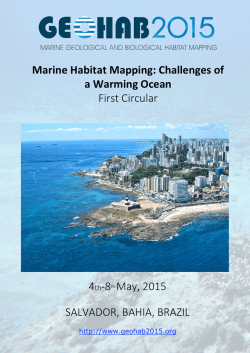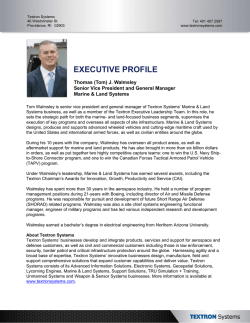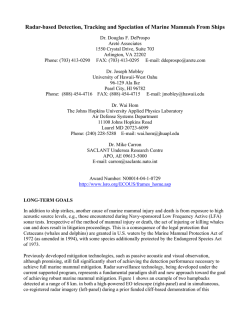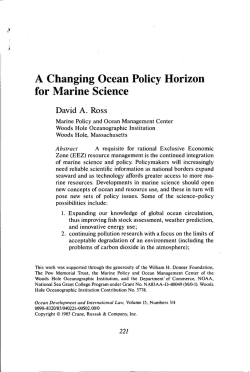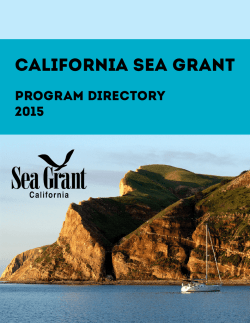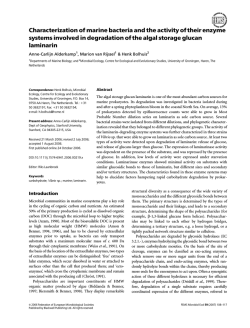
MINews Issue 10
ISSUE 10 | 2013 MI-NEWS w w w. p l y m o u t h . a c . u k / m a r i n e PLYMOUTH HOSTS INTERNATIONAL COASTAL SYMPOSIUM ICS2013 WINNERS REVEALED AT PLYMOUTH UNIVERSITY’S COMMUNITY RESEARCH AWARDS SCIENTISTS REVEAL IDENTITY OF MYSTERY MARINE POLLUTANT DISCARDS BAN COULD IMPACT SEABIRDS POPULATION CONTENTS 03 04 WINNERS REVEALED AT PLYMOUTH UNIVERSITY’S COMMUNITY RESEARCH AWARDS MARIC - INTELLIGENT CONNECTIONS FOR SW MARINE BUSINESSES 06 SCIENTISTS REVEAL IDENTITY OF MYSTERY MARINE POLLUTANT 07 SMART WAY FOR SEAFARERS TO TRACK EFFECTS OF CLIMATE CHANGE 08 PLYMOUTH UNIVERSITY AND UNIVERSITY OF BRUNEI DARUSSALAM TEAM UP TO LEAD THE WAY IN MARINE ACIDIFICATION RESEARCH IN SOUTH EAST ASIA 09 JURASSIC RECORDS WARN OF RISK TO MARINE LIFE FROM GLOBAL WARMING 10 DISCARDS BAN COULD IMPACT SEABIRDS POPULATION 11 LAUNCH OF THE FIRST EUROPEAN-WIDE SURVEY ON MARINE LITTER PERCEPTIONS 12 PLYMOUTH HOSTS INTERNATIONAL COASTAL SYMPOSIUM, ICS2013 NEWS WINNERS REVEALED AT PLYMOUTH UNIVERSITY’S COMMUNITY RESEARCH AWARDS Plymouth University’s Vice-Chancellor’s Community Research Awards are unique in the UK higher education sector, and see the University pledging £50,000 and the support of its academic community to tackle specific challenges, or opportunities faced by local community groups. This year’s award winners were revealed at a gala event at the University last week. The winners are the MS Society, The Word Machine Community Interest Company, Plymouth School Sports Partnership, the Plymouth and District Branch of Parkinson’s UK, Friends of Ham Woods, Shelter Devon, and Wembury Marine Centre Partnership. Centre to research why the many visitors to Wembury Beach decide to engage with the centre or not. The team will also explore the effects of visiting the centre on marine awareness, attitudes The Wembury Marine Centre Partnership, and behavioural intentions at the beach. with Professor Martin Attrill, Director of The research team, led by psychologist the Marine Institute, won an award to Dr Sabine Pahl, then plans to test an investigate ‘The benefits of engaging intervention aimed at increasing visitor with the Marine Centre at Wembury numbers. Beach’, Professor Attrill and his team will work with members of Wembury Marine 03 NEWS MARIC INTELLIGENT CONNECTIONS FOR SW MARINE BUSINESSES This month has seen the formal launch of the new Marine Innovation Centre – a £2M project supported by the European Regional Development Fund (ERDF) setup to significantly enhance and optimise the flow of knowledge and expertise between Higher Education (HE) and Small and Medium-sized Enterprises (SMEs). How: Why: • • • Building on the international success of • the Marine Institute and housed within our brand new Marine Building, together with an Outreach Office at the Bristol & • Bath Science Park, MARIC streamlines access to the cutting-edge resources of the University and its growing network of specialist partners. Run by a dedicated University team and guided by an Industrial Steering Group, MARIC aims to make the South West’s aspiring Marine and Maritime firms globally competitive. 04 Connecting to the Innovation Infrastructure of the University and its partners Identifying opportunities for Product and Process Innovation and Knowledge Transfer • • Promoting and delivering collaborative partnerships • Providing access to dedicated Innovation funding • • • Increase the competitiveness and profitability of Marine Sector SMEs Enhance access to appropriate knowledge, information, technologies and facilities Increase the uptake, commercialisation and impact of academic research Strengthen links to the North of the region through an Outreach Office in Bristol Promote industrial engagement with students and graduates through placements and projects Increase visibility and recognition of SW SMEs to local and national government Joined-up thinking to avoid duplication and confusion in the market place The target audience for the Marine Innovation Centre includes: inventors, prospective entrepreneurs, new and existing business, and inward investors looking to establish operations in the South West Region. MARIC will draw on the knowledge, skills and experience of a range of university staff who will dedicate time to the project in addition to supporting the University’s core activities i.e. teaching, training and research. MARIC aligns well with Plymouth University’s Enterprise vision: to deliver outstanding economic, social and cultural benefits from its intellectual capital. It will enhance interdisciplinary research capacity across a broad range of subject areas both within the University and other regional research centres, for example, the Marine Biological Association (MBA) and Plymouth Marine Laboratory (PML). Ian McFadzen has been appointed as Head of MARIC and Steve Rice as MARIC Project Officer. Further Info t: 0800 052 5600 e: [email protected] w: www.plymouth.ac.uk/enterprisesolutions MARIC will also fund the creation of 3 new posts to support the delivery of the project - these staff will be collectively responsible for: identifying and promoting opportunities for collaborative and applied research with industry, pro-actively marketing the Centre to a regional, national and international audience, ensuring the delivery and reporting of ERDF outputs in-line with contractual obligations and managing relationships with the various external networks and support organisations. 05 RESEARCH SCIENTISTS REVEAL IDENTITY OF MYSTERY MARINE POLLUTANT For further information contact: Professor Steve Rowland ([email protected]) Professor of Organic Geochemistry, Biogeochemistry Research Centre Scientists at Plymouth University appear to have identified the ‘mystery’ waxy oillike substance which has been polluting seabirds along the south coast of the UK. “All of the analytical data we have points to the identification of the substance as a polyisobutene or PIB mixture”, said Professor Steve Rowland. The results show the particular mixture of hydrocarbons in the oil has an average molecular weight of about 1,080 carbon atoms. Manufacturers describe similar materials as colourless, odourless and sticky, all consistent with the appearance of the oil on the birds’ feathers. PIBs are a range of substances varying from low molecular weight oils to high weight solids, but Professor Rowland and Research Officer, Dr Paul Sutton, think the culprit waxy, sticky substance is a mid-range material often used as lubricant additive. The findings have received huge media “With funding from the European coverage, including The Guardian, The Research Council, we have recently Mirror, BBC Radio Five Live, and BBC developed special methods for analysis News Online. of oils in this range, including palm oil, which we were able to rule out at an early stage as a contaminant in this case, as the profiles did not match that of the mystery oil” said Professor Rowland. 06 The researchers received an oiled Guillemot for analysis from the RSPCA, recovered from Chesil Beach in Dorset, and have been conducting laboratory tests upon it. They released their findings to the Maritime & Coastguard Agency and the RSPCA. SMART WAY FOR SEAFARERS TO TRACK EFFECTS OF CLIMATE CHANGE For further information contact: Dr Richard Kirby ([email protected]) Marine Institute Research Fellow Seafarers are being encouraged to take part in a unique global study, using a mobile phone app to record the effects of climate change. The public science project will measure the amount of phytoplankton - minute organisms at the very start of the marine food chain currently residing in the world’s oceans. Scientists fear the population of the microscopic beings is in decline due to rising sea temperatures and, if true, that could have consequences for every aspect of marine life. The project is being spearheaded by the Marine Institute, which hopes to build a map of the oceans that charts the seasonal and annual changes of phytoplankton from now into the future. Attached to a measuring tape, the Secchi Disk is lowered over the side of a boat and the depth at which it disappears from sight estimates the amount of phytoplankton in the sea. This depth can then be uploaded to a database using the Secchi app. global population of sailors involved, we can generate a database that will help us understand how life in the oceans is changing. It would help us learn much more about these important organisms at a crucial time when their habitat is altering due to climate change.” Dr Kirby added: “The Secchi Disks are still used by marine scientists to study phytoplankton but there are too few scientists to survey the world’s oceans as well as we would wish. This app enables seafarers around the world to take part in a science project and if we can just get a small percentage of the The Secchi app has been developed by Drs Nicholas Outram and Nigel Barlow, from the School of Computing and Mathematics, and the database will be maintained by Pixalytics Ltd, a company founded by Dr Sam Lavender, an Honorary Reader at the University. Dr Richard Kirby, who is leading the study, said: “As the phytoplankton live at the surface of the sea they are being affected by rising sea temperatures due to climate change. A scientific paper published last year suggested the ocean’s plankton population had declined by as much as 40 per cent since 1950. Like all marine creatures, phytoplankton have a preferred optimum sea temperature no matter where they are in the world and we need to know more about how they are changing in order to understand the effects on the ocean’s biology.” To check the levels of phytoplankton in our oceans, marine experts have developed a free smart phone app for sailors and fishermen to use wherever they are in the world. Because the phytoplankton – each thinner than a strand of human hair – exist at the sea’s surface, mariners can carry out a simple experiment using an easy to make ‘Secchi Disk’. 07 RESEARCH PLYMOUTH UNIVERSITY AND UNIVERSITY OF BRUNEI DARUSSALAM TEAM UP TO LEAD THE WAY IN MARINE ACIDIFICATION RESEARCH IN SOUTH EAST ASIA By Professor Jason Hall-Spencer ([email protected]) Professor of Marine Biology, Marine Biology & Ecology Research Centre Professor Jason Hall-Spencer discussing artisanal mariculture practices with local people in the Sungai Brunei estuary, in respect of future acidification impacts. It is crucial for future management practices to understand which will be the ‘winners’ and ‘losers’ as the marine environment becomes more acidified. Increases in atmospheric carbon dioxide are causing an increase in the dissolution of this gas in the oceans of the world, in turn causing the oceans to become more acidic. The consequences of ocean acidification (OA) are dire, as this causes the loss of carbonate from the skeletons of calcifying marine organisms, such as gastropod molluscs and coral reef forming organisms. The future demise of these ecologically important organisms and systems is likely to impact ecosystem services, fisheries and food security, at a time when the world demand for food is likely to escalate alarmingly in relation to human population growth. 08 Dr David J. Marshall, his Universiti Brunei Darussalam (UBD) collaborators (Drs Lee Hoon Lim and Jose Santos), and his team of international graduate students (Belal Hossain, Aimimuliani Adam and Sorya Proum) have been exploring the effects of acidification in the Brunei estuarine system for some time. To improve understanding of how their system may relate to carbonate-chemistry-driven OA, they recently invited Jason HallSpencer, a world expert on OA and Professor of Marine Biology at Plymouth University, to visit and collaborate on research projects. While in Brunei Jason exchanged valuable information with the PhD students and presented two lectures describing work published in 2012 in the premier science journals, Nature Climate Change and Global Change Biology. A spinoff of Professor Hall-Spencer’s visit was a discussion around the lack of monitoring data available for the South China Sea, despite the extensive global monitoring programmes currently in place. Encouraged by the need for OA data, Drs David Marshall and David Lane, are putting plans in place to establish an OA monitoring system off the coastline of Brunei. An MoU is being prepared between UBD and Plymouth University Marine Institute, to facilitate researcher and student exchanges in OA research. JURASSIC RECORDS WARN OF RISK TO MARINE LIFE FROM GLOBAL WARMING For further information contact: Professor Richard Twitchett ([email protected]), Professor of Geology Centre for Research in Earth Sciences (CRES) The risk posed by global warming and rising ocean temperatures to the future health of the world’s marine ecosystem has been highlighted by scientists studying fossil records. Researchers at Plymouth University believe that findings from fieldwork along the North Yorkshire coast reveal strong parallels between the Early Jurassic era of 180 million years ago and current climate predictions over the next century. Through geology and palaeontology, they’ve shown how higher temperatures and lower oxygen levels caused drastic changes to marine communities, and that while the Jurassic seas eventually recovered from the effects of global warming, the marine ecosystems that returned were noticeably different from before. floor at the time the rocks were laid down. The researchers, working with Dr Crispin Little from the University of Leeds, were then able to correlate the ecological data with published data on changes in temperature, sea level and oxygen concentrations. Dr Danise said: “Back in the laboratory, we broke down the samples and identified all of the fossils, recording their relative abundance much like a marine biologist would do when sampling a modern environment. Then we ran the ecological analyses Professor Twitchett added: “The results show in unprecedented detail how the fossil Jurassic communities changed dramatically in response to a rise in sea level and temperature and a decline in oxygen levels. “Patterns of change suffered by these Jurassic ecosystems closely mirror the changes that happen when modern marine communities are exposed to declining levels of oxygen. Similar ecological stages can be recognised in the fossil and modern communities despite differences in the species present and the scale of the studies.” The results of the Natural Environment Research Council-funded project are revealed for the first time in this month’s PLOS ONE scientific journal. Professor Richard Twitchett, from the University’s School of Geography, Earth and Environmental Sciences, and a member of its Marine Institute, said: “Our study of fossil marine ecosystems shows that if global warming is severe enough and lasts long enough it may cause the extinction of marine life, which irreversibly changes the composition of marine ecosystems.” Professor Twitchett, with Plymouth colleagues Drs Silvia Danise and MarieEmilie Clemence, undertook fieldwork between Whitby and Staithes, studying the different sedimentary rocks and the marine fossils they contained. This provided information about the environmental conditions on the sea to determine how the marine seafloor community changed through time.” The team found a ‘dead zone’ recorded in the rock, which showed virtually no signs of life and contained no fossils. This was followed by evidence of a return to life, but with new species recorded. The NERC project – ‘The evolution of modern marine ecosystems: environmental controls on their structure and function’ – runs until March 2015, and is one of four funded under their Coevolution of Life and the Planet research programme. 09 RESEARCH DISCARDS BAN COULD IMPACT SEABIRDS POPULATION For further information contact Dr Stephen Votier ([email protected]) Associate Professor in Marine Ecology, Marine Biology & Ecology Research Centre Species of seabirds could successfully return to their natural foraging habits following changes to European fisheries policies, scientists have suggested. The European Parliament recently voted to scrap the controversial discards policy, which has seen fishermen throwing thousands of edible fish and fish waste back into the sea because they have exceeded their quotas. Scientists at Plymouth University believe this could have a negative impact on some seabirds, which have become used to following the fishing vessels and are increasingly reliant on their discards. But they say others could return to using foraging as their sole source of food, as long as there are sufficient numbers of fish to meet their needs. Dr Stephen Votier, Associate Professor in Marine Ecology at Plymouth University, led the study. He said: “Policy changes can have unforeseen consequences, and the recent decision on the EU discards policy will pose challenges for a number of species. Many seabirds have come to rely to some extent on fishing vessels for food and globally, commercial capture fisheries generate huge quantities of discards. However, we believe there is a level of resilience among seabirds which means they will be able to overcome these challenges.” The study focused on populations of northern gannets on Grassholm Island, in Wales, with tiny cameras and GPS trackers being attached to birds to monitor their foraging habits. The cameras captured more than 20,000 images, allowing scientists for the first time to analyse where the birds had flown to source food, precisely what 10 they had fed on, and other details such as their sex and reproductive status. The findings showed 42% of birds regularly targeted fishing vessels, as well as searching for naturally occurring prey, while 81% of male gannets used fishing vessels to source food and 30% of female birds did so. Dr Votier added: “We have used cuttingedge technology to reveal the private lives of seabirds at sea – in this instance how they interact with fisheries – and the findings suggest scavenging is more common in this species than previously thought. This suggests a discard ban may have a significant impact on gannet behaviour, particularly so for males, but a continued reliance on ‘natural’ foraging shows the ability to switch away from discards, but only if there is sufficient forage fish to meet their needs in the absence of a discard subsidy.” The research study, which also involved scientists from the Plymouth Marine Laboratory and the Centre d’Etudes Biologiques de Chize in France, was conducted under licence from the Countryside Council for Wales and the British Trust for Ornithology. It received funding from the National Environment Research Council, and the full findings are published in the PLOS ONE scientific journal. LAUNCH OF THE FIRST EUROPEAN-WIDE SURVEY ON MARINE LITTER PERCEPTIONS By Bonny Hartley, Sabine Pahl and Richard Thompson, Marine Biology and Ecology Research Centre (MBERC) and Centre for Research in Brain, Cognition and Behaviour (CBCB), [email protected] A European-wide survey which aims to provide the first detailed insight into people’s perceptions of marine litter has just been launched by psychologists and marine biologists at Plymouth University. The survey will assess how people’s attitudes toward the impacts and the potential solutions to this growing environmental problem vary between countries and between those who manufacture, sell, use or dispose of the numerous items which can become marine litter. The survey is being led by Professor Richard Thompson from the School of Marine Science & Engineering and Dr Sabine Pahl and Bonny Hartley from the School of Psychology. Professor Thompson said: “We know that marine litter harms a wide range of marine life including commercially important species, many of which are critically endangered. This debris presents a hazard to mariners and is exceptionally costly to clean up. Yet many of the items we commonly find as marine debris, such as packaging, have no reason to accumulate in the sea. This survey provides an exciting opportunity to help understand the underlying causes and identify potential solutions to this major environmental problem’’ Marine litter refers to the persistent, manufactured, or processed solid material that is discarded, disposed of, or abandoned on the coast and in the sea. The purpose of this new survey is to understand what people’s opinions are about this environmental issue. For example, we want to understand people’s perceptions about the type of litter found in the sea, where it comes from, what the consequences are, and who is responsible. Research Fellow Bonny Hartley explains: “Marine Litter is a societal issue in which people play a crucial role through their decisions and behaviours. It affects visitors to beaches, it’s caused by consumers, retailers and other stakeholders and it can only be solved by people together. Understanding current Europe-wide attitudes and perceptions of the problem is a crucial step in developing solutions that are feasible and accepted by society.” The survey will compare people’s views in 16 countries across the NE Atlantic, Mediterranean, Baltic and Black Sea regions (UK, Ireland, France, Netherlands, Germany, Belgium, Portugal, Italy, Greece, Cyprus, Turkey, Denmark, Romania, Slovenia, Bulgaria, and Spain) and from different sectors across society, including recreational and commercial users of the coast and sea; environmental groups; educators; government and policy makers; the media; waste management sectors; and designers, manufacturers and retailers of items that can potentially become marine litter. © Richard Thompson (SoMSE) The goal of the project is to raise societal awareness of the problems and potential solutions relating to the accumulation of marine litter, in order to inspire changes in people’s attitudes and behaviours towards this environmental issue. The survey takes about 15 minutes and all information is anonymous and confidential. Be part of this Europeanwide survey about marine litter here: https://www.psy.plymouth.ac.uk/ MARLISCO The survey is part of a 3-year, 4.5 Million EURO EU funded project ‘MARLISCO’ (Marine Litter in Europe Seas: Social Awareness and Co-Responsibility, http:// www.marlisco.eu/). Here, Plymouth University is working in collaboration with 19 organisations from around Europe including other universities, government agencies, environmental groups and industry. 11 EVENTS PLYMOUTH HOSTS INTERNATIONAL COASTAL SYMPOSIUM ICS2013 By Professor Paul Russell ([email protected]) Head of Centre for Research in Coastal and Ocean Science and Engineering (CCOSE) The world’s largest gathering of coastal researchers came to Plymouth University from 8-12th April, for the 12th International Coastal Symposium (ICS2013). The conference, which is held in a different country every two years, was organised by the Coastal Processes Research Group, part of the Centre for Research in Coastal and Ocean Science and Engineering (CCOSE), and sponsored by the Marine Institute. Over 500 of the world’s leading coastal researchers from 38 different countries attended the week-long event. A total of 540 technical papers were presented, 300 as oral presentations and 240 as posters. The conference theme was ‘Coastal Environments and Global Change’, and there were sessions on topics such as coastal evolution, coastal hazards, extreme storms and marine renewable energy. The conference included a special session of papers from invited international scientists to celebrate the research and lifetime achievements of Emeritus Professor David Huntley whose work at Plymouth University over 20 years helped propel it into the international forefront of coastal research. Professor Gerd Masselink, of the School of Marine Science and Engineering, and lead on the conference organising committee, said: “The latest advances in science were presented at the conference, but the meeting also provided a forum for discussing, comparing and contrasting the approaches used by different countries to combat, mitigate and adapt to climate change impacts in the coastal zone. The attendance of over 500 delegates represents a ringing endorsement by the international community of the lead role Plymouth plays in this area.” The keynote speakers at the conference were: Professor Colin Woodroffe, a leading coastal geomorphologist from University of Wollongong, Australia; Professor Marcel Stive, Professor of Coastal Engineering and Department Head of Hydraulic Engineering at Delft University of Technology, The Netherlands; and Dr Edith Gallagher, a physical oceanographer formerly of Scripps Institute of Oceanography, USA. In addition to the conference sessions, delegates attended an Icebreaker hosted by the National Marine Aquarium and took part in visits to a number of field sites in the South West, including Perranporth Beach in North Cornwall where the University has been conducting extensive research on rip currents with the RNLI. Delegates also received tours of the University’s new Marine Building, complete with state of the art wave tanks as part of its Coastal Ocean and Sediment Transport (COAST) facility. Proceedings of ICS2013 will appear as printed volumes in a special issue of the Journal of Coastal Research published by the Coastal Education & Research Foundation (CERF). 12 The ICS2013 Organising Committee looking suitable pleased at the Conference Closing Dinner, from L to R, Grisha Shapiro, Ken Kingston, Paul Russell, Gerd Masselink, Claire Earlie, Hélène Bryant, Daniel Conley, Tim O’Hare, Tim Poate, Mark Davidson (Jon Miles is missing from this picture).
© Copyright 2026
